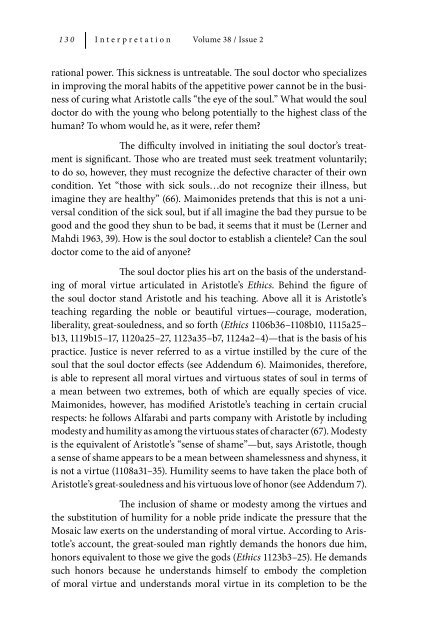105 119 147 171 177 197 - Interpretation: A Journal of Political ...
105 119 147 171 177 197 - Interpretation: A Journal of Political ...
105 119 147 171 177 197 - Interpretation: A Journal of Political ...
You also want an ePaper? Increase the reach of your titles
YUMPU automatically turns print PDFs into web optimized ePapers that Google loves.
1 3 0 I n t e r p r e t a t i o n Volume 38 / Issue 2<br />
rational power. This sickness is untreatable. The soul doctor who specializes<br />
in improving the moral habits <strong>of</strong> the appetitive power cannot be in the business<br />
<strong>of</strong> curing what Aristotle calls “the eye <strong>of</strong> the soul.” What would the soul<br />
doctor do with the young who belong potentially to the highest class <strong>of</strong> the<br />
human? To whom would he, as it were, refer them?<br />
The difficulty involved in initiating the soul doctor’s treatment<br />
is significant. Those who are treated must seek treatment voluntarily;<br />
to do so, however, they must recognize the defective character <strong>of</strong> their own<br />
condition. Yet “those with sick souls…do not recognize their illness, but<br />
imagine they are healthy” (66). Maimonides pretends that this is not a universal<br />
condition <strong>of</strong> the sick soul, but if all imagine the bad they pursue to be<br />
good and the good they shun to be bad, it seems that it must be (Lerner and<br />
Mahdi 1963, 39). How is the soul doctor to establish a clientele? Can the soul<br />
doctor come to the aid <strong>of</strong> anyone?<br />
The soul doctor plies his art on the basis <strong>of</strong> the understanding<br />
<strong>of</strong> moral virtue articulated in Aristotle’s Ethics. Behind the figure <strong>of</strong><br />
the soul doctor stand Aristotle and his teaching. Above all it is Aristotle’s<br />
teaching regarding the noble or beautiful virtues—courage, moderation,<br />
liberality, great-souledness, and so forth (Ethics 1106b36–1108b10, 1115a25–<br />
b13, 1<strong>119</strong>b15–17, 1120a25–27, 1123a35–b7, 1124a2–4)—that is the basis <strong>of</strong> his<br />
practice. Justice is never referred to as a virtue instilled by the cure <strong>of</strong> the<br />
soul that the soul doctor effects (see Addendum 6). Maimonides, therefore,<br />
is able to represent all moral virtues and virtuous states <strong>of</strong> soul in terms <strong>of</strong><br />
a mean between two extremes, both <strong>of</strong> which are equally species <strong>of</strong> vice.<br />
Maimonides, however, has modified Aristotle’s teaching in certain crucial<br />
respects: he follows Alfarabi and parts company with Aristotle by including<br />
modesty and humility as among the virtuous states <strong>of</strong> character (67). Modesty<br />
is the equivalent <strong>of</strong> Aristotle’s “sense <strong>of</strong> shame”—but, says Aristotle, though<br />
a sense <strong>of</strong> shame appears to be a mean between shamelessness and shyness, it<br />
is not a virtue (1108a31–35). Humility seems to have taken the place both <strong>of</strong><br />
Aristotle’s great-souledness and his virtuous love <strong>of</strong> honor (see Addendum 7).<br />
The inclusion <strong>of</strong> shame or modesty among the virtues and<br />
the substitution <strong>of</strong> humility for a noble pride indicate the pressure that the<br />
Mosaic law exerts on the understanding <strong>of</strong> moral virtue. According to Aristotle’s<br />
account, the great-souled man rightly demands the honors due him,<br />
honors equivalent to those we give the gods (Ethics 1123b3–25). He demands<br />
such honors because he understands himself to embody the completion<br />
<strong>of</strong> moral virtue and understands moral virtue in its completion to be the
















